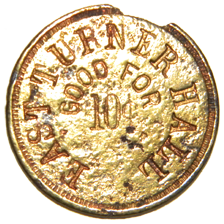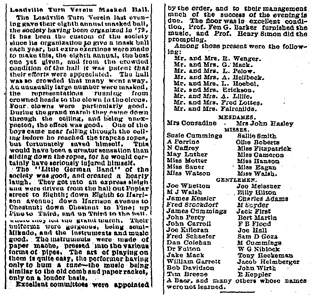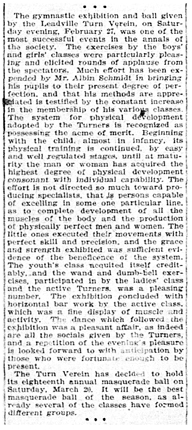These clips of text are provided with the very gracious permission of the Don L. Griswold Trust and the Colorado Historical Society in cooperation with the University Press of Colorado, publishers of the History of Leadville and Lake County, Colorado: From Mountain Solitude to Metropolis by Don L. Griswold and Jean Hervey Griswold, Boulder, 1996.
The Turnvereins, having steadily increased in number and anticipating an even larger membership, met in the law office of M. J. Waldheimer on the night of April 7 (1880) to make plans for the future and to elect new officers. They first discussed the advisability of renting or building another hall so as to provide adequate space for their gymnastic classes, their musical and dramatic entertainments and for their dances. After deciding a new hall was needed, the election of officers for the ensuing year resulted in Charles Boettcher being chosen president; Otto Berger, vice president; John Bruckman, secretary; and Jacob Schloss, treasurer. The next order of business was drawing up articles of incorporation with the capital stock of the new corporation fixed at ten thousand dollars, with one thousand shares, ten dollars each, which were to be quickly taken up by the organization's "men of means." Secretary Bruckman accepted the responsibility of filing the necessary papers with Colorado's secretary of state, Norman Meldrum.
The Evening Chronicle, June 9, 1880
TURN-HALLE
--------------
The celebration of the laying the corner stone of Turner Hall to-day was a grand affair, being participated in by a large number of our citizens, who, after a parade through the principle streets, repaired to the S.E. corner of Fourth and Pine streets, for the ceremonies.
The line of march was arranged as follows:
Police Squad.
Band.
Chief Marshal and Aids.
Mayor and Common Council accompanied by the Building Committee in Carriages.
Members of the Press.
Citizens in Carriages.
Vienna Ladies Orchestra Band.
Fire Department.
Militia.
Knights of Pythias.
Free Masons----Pacific Coast Association.
Odd Fellows----Veterans.
Ancient Order of Hibernians.
Bricklayers' Union.
Miners' and Mechanics' Union.
Citizens on Foot.
Citizens on Horseback.
Castello's Great American Circus.
Members of the Theatrical Profession.
Mr. Theo. Pinther, the marshal of the day, made a speech in German, and following this he introduced Mr. M. J. Waldheimer, the orator of the day, who delivered an eloquent address substantially in these words:
Ladies and Gentlemen, and Members of the Turn Verein Society:
After listening to the eloquent words of the gentleman who has preceded me, which has left an impression upon my mind like Italian music, the sentiment of which is better understood than the words can be remembered, I am impressed with the importance of this occasion with greater force than I otherwise would be.
The origin of athletic sports we trace back to the days of Greece and Rome and was subsequently adopted into good old English customs, in which physical development became one of the principal objects of their athlete societies. The Scotch too cultivated social athletic genius, and from this we have the best examples of Caledonian manhood and the best types of human development. But it was left to the Germans to organize a society which combined athletic sports with social, mental and physical development. The objects of these societies were to prepare men to better endure the hardships of war, which resulted in developing the best and strongest men Germany ever had.
These societies were first introduced to this country in New York in 1848, and have since spread over every portion of the United States wherever Germans are found.
These societies have cemented the German's love for American institutions, and it is with special pride that I feel when called upon to speak upon the occasion of establishing another temple of this kind in Leadville, upon the grand lighthouse of the American continent. In these ceremonies we celebrate the highest ideal of liberty and harmony that it is possible for mankind to conceive.
Mayor Humphreys being introduced by Judge Waldheimer, spoke as follows:
LADIES AND GENTLEMEN: I thank you for the honor you confer upon me on this occasion, and I assure you it is with great pleasure I arise as an officer of this wonderful city, to encourage and cooperate with you in so noble an enterprise. No race of people so thoroughly understand the great benefits of such an institution as this as our German fellow citizens. I consider it a great compliment to Leadville and one of the best evidences of prosperity in the future, that so cautious a people as the Germans--who never rush headlong into anything--should deem it advisable to erect such an ornamental and useful structure in this city, for physical improvement and social enjoyment, where through the long future the pioneer will find a welcome and a home. Such institutions tend to bind us together, and make us a happier and better people, for which, in behalf of our city, I thank our German brethren, who are in peace and war so loyal to our Constitution, our Union and our destiny. May the wheels of prosperity westward roll under cars with open door to welcome stranger, till every fifty miles square of free America would pay if gridironed by the iron tie of commerce. We will now proceed to dedicate the laying of the corner stone of this handsome building.
After the Mayor's speech followed the laying of the corner stone by that official.
There was deposited in the aperture of the corner stone the constitution and by-laws of the society, the German Zeitung and a copy of the DAILY CHRONICLE, together with various coins and business cards
The following are the committees:
Committee of arrangements------J. H. Monheimer, I. Baer, J. Bruckman.
Building Committee------Chas. Boettcher, Otto Berger, J. Schloss, S. E. Bruckman, J. H. Monheimer, E. Kuehl, I. Baer.
Architect and superintendent------M. H. Grossmayer.
Contractors------B. F. Grimes & Co.346
The same week of October in which the Carbonate City's Irish citizens were so busy, those Leadvillites of German origin had cause for celebration. Full coverage of their activities was also given in the Chronicle, the major article reading in part:
Yesterday evening [the 17th] the Leadville Turn Verein celebrated its first anniversary at the old Turn Halle on East Third street, opposite Oak street, by one of those varied and excellent programmes of appropriate festivities that our German fellow-citizens are so justly celebrated for. Like everything else in that line that they undertake, the anniversary was all its most ardent well-wishers could hope for. The large hall was tastefully decorated, and big as it is, it was at an early hour filled to its utmost capacity. The proceedings began with a splendidly executed overture. If there is anything the German people anywhere insist one, it is good music. Nothing ordinary or merely passable in that line will content them, and on this occasion, they had no cause to complain. Some of the very best musical selections that the old "Fatherland" is able to furnish were rendered in faultless style. The address of the evening was delivered by Mr. J. Schloss, who, in a brief, but masterly manner, gave a succinct history of the establishment of the Turner Society in Leadville, how it grew from small beginnings (twelve members) to its present permanent prosperity (one hundred eighteen members). Many of his sentiments were vociferously cheered, and at the conclusion of his remarks, the memory of the "Fatherland" and the German Turn Verein, as well as Leadville and all its interests, received three hearty "Gut Heils."
These lusty cheers were followed by "a bright and sparkling comedietta," which in turn was followed by the time-honored gymnastic exhibition. The newsmen, attending the anniversary, were amazed especially by the agility and skill of Robert Atwood, pantryman at the Tontine Restaurant, who fourteen hours earlier, as a member of the volunteer fire boys, had worked so hard in fighting the fire on the corner of Chestnut Street and Harrison Avenue. The grand finale of the evening was a social hop which kept the zestful Turnvereins and their guests:
...busy until a late, or rather early hour, and when at last all went home under the glorious moonlight that flooded the white landscape with its light, they were ready to make a solemn affidavit, that a more truly happy night had never been spent by any of them.

Griswold, page 914, Chronicle, 1881
The terpsichorean affairs receiving the most plaudits from the press were those of the Knights of Robert Emmet on the 7th, the Turnvereins on the 15th, the Benevolent Society of Hebrew Ladies on the 17th, and of the Episcopalians on the 19th. On the night of October 20, Leadvillites had to choose between Professor Godat's hop in Union Hall and an Apollo Club concert in City Hall.
Griswold, page 2147, 1893
Some of the many functions given by the societies had become traditional by the opening of Leadville's second decade and included: the yearly banquets and balls held in observance of the anniversaries of the founding of the national organization of the various local chapters; the celebrating of St. Patrick's Day with the Knights of Robert Emmett Ball and a parade by the Hibernians; the Hebrew Ladies Benevolent Society's Purium Ball; the Ladies Relief Corps' Calico or Hard Times Ball; the G.A.R. Memorial Day ceremonies; the Women's Industrial Exchange's amateur dramatic performances; and the Turnvereins' gymnastic exhibitions, picnics and masquerades. The numerous entertainments and balls of the military were not continued into the second decade, but the Rocky Mountain Rifles, the remaining Leadville unit of the Colorado National Guard, did give annual balls each winter during the 1889-1893 years.



